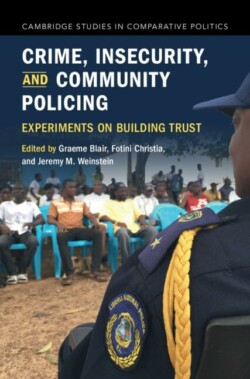
Crime, Insecurity, and Community Policing Experiments on Building Trust
Graeme Blair, Fotini Christia, Jeremy M. Weinstein
How can societies effectively reduce crime without exacerbating adversarial relationships between the police and citizens? In recent decades, perhaps the most celebrated innovation in police reform has been the introduction of community policing, where citizens are involved in building channels of dialogue and improving police-citizen collaboration. Despite the widespread adoption of community policing in the United States and increasingly in the developing world, there is still limited credible evidence about whether it realistically increases trust in the police or reduces crime. Through simultaneously coordinated field experiments in a diversity of political contexts, this book presents the outcome of a major research initiative into the efficacy of community policing. Scholars from around the world uncover whether, and under what conditions, this highly influential strategy for tackling crime and insecurity is effective. With its highly innovative approach to cumulative learning, this project represents a new frontier in the study of police reform.
- Provides rigorous evidence of the efficacy of community policing and the conditions under which these strategies are effective in a diversity of political contexts
- A set of simultaneously coordinated field experiments across six countries and three continents in the Global South model how to use a common theoretical framework, a standardized measurement strategy, and an integrated analysis to produce generalizable knowledge
- One of the first multi-site experiments in the social sciences conducted in partnership with government agencies – demonstrating how to use advanced techniques in the social sciences to deepen our understanding of fundamental problems in society

